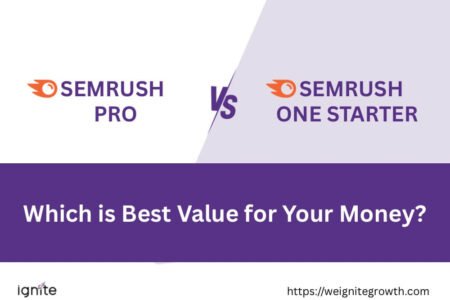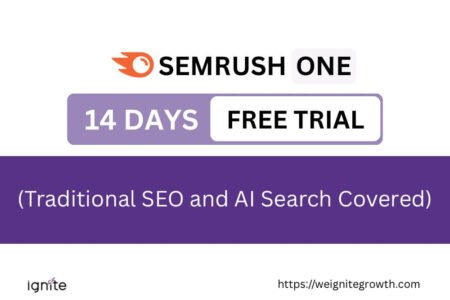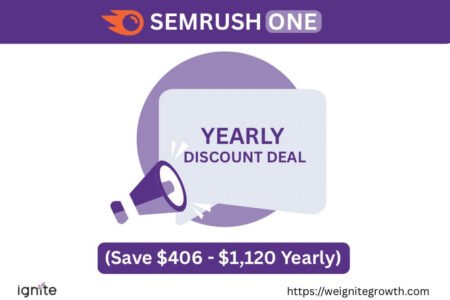Most website builders come with unique features and functions you’d find helpful in your website-building process.
So, how do you choose the best website builder for your SEO needs? One that has the SEO features you need when building a website that ranks on search engines?
In this blog post, I’ll outline the pros and cons of the most popular website builders so you can decide which is right for your business.
Remember that these opinions are based on my own experience – your experience may differ!
What is a website builder?
A website builder is a platform or software that allows you to create, design, and publish a website without writing a line of code. It provides templates and drag-and-drop functionalities, which makes it easy for you to build a professional-looking website even if you have limited technical skills.
With a website builder, all you need to set up your website are your branding elements, content, and media files. This would be helpful if you’re a small business owner who needs a website with a wide range of features but has a limited budget for a custom-code website.
The best website builders for SEO are the ones that help you make your website search-engine friendly. They help you provide an amazing user experience to your site visitors, optimize your site for all devices, create SEO-friendly URLs, and more.
What is a website builder for SEO?
An SEO website builder works simply by providing you with a range of templates and features that are specifically optimized for SEO. These builders have clean code, fast load times, and are mobile-responsive – all factors that search engines love.
These builders often come with built-in SEO tools or plugins. You can optimize meta tags, create SEO-friendly URLs, and even get suggestions for improving your site’s SEO.
If it doesn’t have inbuilt plugins, an SEO website builder will at least make it easy for you to install plugins and extensions to make your website SEO-friendly.
The 7 best website builders small businesses can use
I will now break down the pros and cons of the top website builders for SEO so that you can better choose the right one for your small business.
Overall, here are 7 of the best website builders for small businesses:
- Elementor
- Shopify
- Wix
- Weebly
- Squarespace
- GoDaddy
- Webflow
1. Elementor
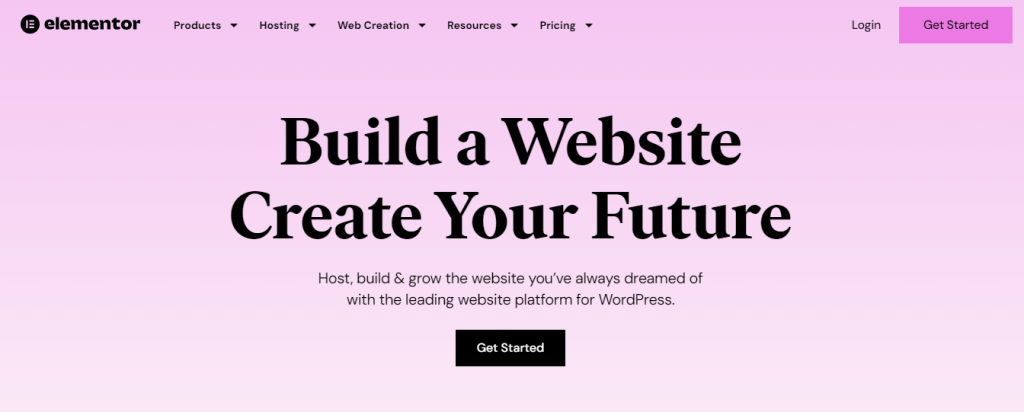
Though not a standalone website builder like Wix or Squarespace, Elementor is a powerful drag-and-drop page builder for WordPress. It is a plugin that enhances WordPress’s functionality by allowing people to design and customize their websites without writing a line of code.
Therefore, if you don’t want to use WordPress’s in-built website builder or custom code your website, you can combine Elementor and WordPress to enjoy a smooth website-building experience.
Elementor provides a library of templates and blocks you’d find helpful for your website design. But what I find more fascinating are its customization features. You can effortlessly edit your title tags, meta descriptions, and heading structures to target your desired keywords.
Elementor pricing
Elementor pricing plans start at $4.92 to $33.25 per month, billed annually.
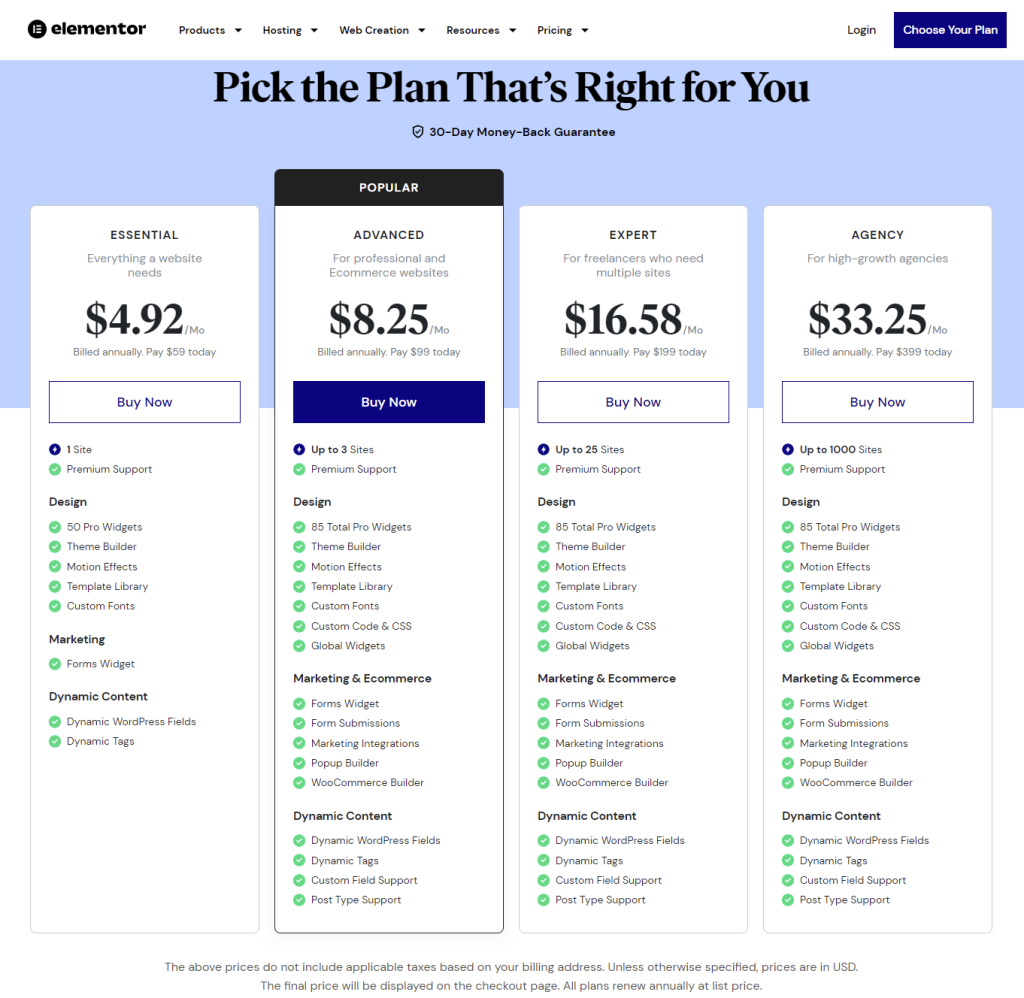
Elementor pros
1. User-friendliness
Even without any design experience, you’d find using Elementor to set up your WordPress website pretty easy. All you need is to pick the suitable template or block, make a few changes to match your brand, and boom, you have a fully functional website for your business.
2. Extensive features
Elementor’s functionality can only be matched by some top website builders for SEO, such as Wix, Squarespace, and Shopify. It offers both basic and advanced features for optimizing your website effectively for SEO.
3. Design flexibility
Elementor makes it easy for you to customize every section of your website. You determine how you want your website to look or function.
Once you install Elementor, you can change your heading tags, fonts, URL structures, and title tags. You can also implement rich snippets, manage redirects, and customize your sitemaps without leaving the Elementor interface.
Elementor cons
1. Dependency on plugin
Your designs depend heavily on Elementor. Switching to another page builder or theme may require significant rework. Deactivating Elementor can leave shortcodes in your content, which can be cumbersome to clean up.
2. Performance impact
Elementor can sometimes slow down your website, especially if you add many elements and widgets or use multiple plugins.
Who should use Elementor?
Elementor is ideal for WordPress users who want more flexibility in creating blogs, websites, or online stores that rank seamlessly on search engines.
2. Shopify

Shopify is primarily used by e-commerce businesses. It’s a good choice for small businesses and entrepreneurs who want an all-in-one solution for their online store.
You can use Shopify to create a website, an online store, and a POS (point of sale). The platform provides all the tools you need to create a professional online store, including product listings, shopping cart functionality, and secure payment processing.
Their recently added AI tool suite, Shopify Magic, enables you to generate text for product descriptions, email subject lines, and headings. This is part of what makes Shopify one of the best e-commerce site builders for SEO available.
Shopify Pricing
Shopify plans start at $29 per month, but for advanced websites, they can go up to $299 per month.
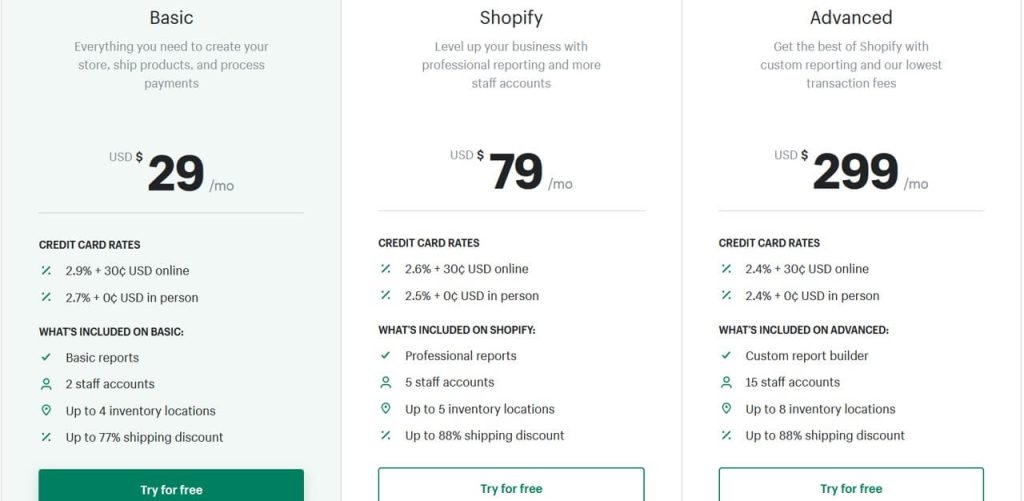
Shopify Pros
1. Supports all types of e-commerce
Shopify offers many features for online stores, such as inventory management and e-commerce analytics.
If you want to add features to your websites, such as product reviews or customer testimonials, there is likely a Shopify app for that.
Shopify also offers many integration options, which make it easy to connect your Shopify account to other platforms, such as accounting or shipping software.
2. Self-sufficient
With Shopify, you can create a self-sufficient website for your business to process transactions without any third-party assistance.
You don’t need to use third-party apps for your store, and the checkout process is as smooth and streamlined as possible.
Shopify also maintains your site with regular updates and backups.
3. User-friendly
The most significant advantage of Shopify is that it is a user-friendly e-commerce website platform that supports many products. If you have never created a website store before, Shopify will make the process very easy for you.
Even if you are not technical, you can create a professional-looking website with Shopify.
4. Support
Shopify offers 24/7 premium customer support to answer your questions and help you troubleshoot issues.
This is especially helpful if you are creating your first online store and need help guiding you through.
Shopify Cons
1. Limited customization
Shopify offers a wide range of prebuilt templates on which to base your design.
However, extensive customizations can be complicated if you don’t have any web design experience. You may need to hire an external developer.
2. Limited SEO-friendliness and content marketing
Shopify has some SEO features built in. Page speed, responsiveness, and user experience are generally good.
However, it does not let you customize URLs, and the blogging feature is not advanced or intuitive. It also does not offer a rich snippet feature.
3. Expensive
Shopify’s basic plans are pretty premium, especially compared to WordPress and Wix.
You may also need to buy additional apps, such as marketing automation, and pay a transaction fee for each sale.
So, all these charges add up to make Shopify an expensive website platform.
However, remember that Shopify is meant for businesses that generate enough sales from online stores, so this cost should be easy to recover.
If you want to display your products and services online but not generate revenue, Shopify might be an expensive website platform for you.
4. No email hosting
Most website platforms include email hosting. In other words, you get an email address connected to your domain name to make it more professional.
For example, if your website is example.com, your email could be abc@example.com.
This feature is not included in Shopify, which means you need to pay for a professional email service, which further increases your cost.
5. Difficult to switch
It can be difficult to switch from another platform to Shopify if you have an existing website.
It is possible to do this, but it requires some technical knowledge. If you are uncomfortable with technology, choosing a different platform may be a better option for you.
Who should use Shopify?
Shopify is pricey, making it a bad choice for small business owners who are on a tight budget. However, if you can afford it, Shopify is excellent for any e-commerce needs you might have.
3. Wix

Wix is a popular website builder for SEO that allows you to create and design a website without coding.
It is one of the biggest website builders for SEO in the aspect that it is not specifically meant for one kind of website. With Wix, you can easily create a brand website, a product website, a blog, and an e-commerce site.
Overall, Wix is a good choice if you want an easy-to-use website builder that doesn’t require coding skills. It offers built-in SEO tools and features like structured data markup, Robots.txt editor, Server Side Rendering (SSR), URL customization, XML Sitemaps, and lots more.
Wix Pricing
Wix has a free version with limited features and storage space. The free version does not let you create a custom domain. Your website will contain the subdomain wix.com.
Its premium plans start at $16 per month for non-e-commerce sites but with storage of only 2GB.
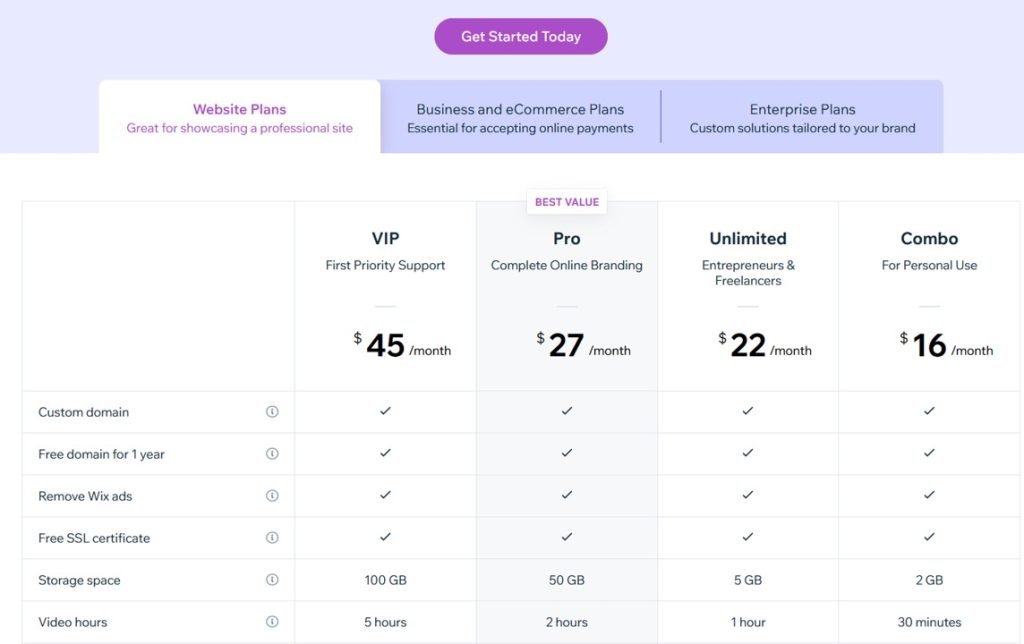
Wix Pros
1. User-friendly
Wix is very user-friendly. Its intuitive drag-and-drop interface makes adding content and designing your website relatively easy.
It also has a built-in guide and website builder, which leads you through the setup process.
2. Customization with the Wix app store
Wiz does not allow the usage of external plugins.
However, it provides templates and features through additional apps in its App Store.
You can install additional apps to your website to extend functionality and create a unique website that reflects your brand identity.
3. Low risk of incompatibility
One of the great advantages of using Wix is that, unlike WordPress, there is no risk of compatibility issues between apps.
All the Wix App Market apps are built specifically for use with Wix websites, so you can be confident that they will work seamlessly.
You can add as many apps as you need to your website without worrying about conflicts.
Wix Cons
1. Limited e-commerce functions
Wix can be used for any kind of website, including online stores, but it is not the best choice for more extensive product catalogs.
Additionally, you can only sell in one currency, making it a bit limited.
2. Not great for content marketing
You can create a blog on Wix and add posts, but the user interface is less intuitive than WordPress, and for some features, you need HTML knowledge, which can be difficult if you want to upload content regularly for your business.
3. Limited options for SEO
Wix websites are not as easily optimized for search engines as websites built on WordPress.
Even though Wix has been improving its SEO, the option of adding unlimited plugins on WordPress means that you can add multiple features to make your WordPress website more SEO-friendly.
Who should use Wix?
Wix is an excellent choice for both personal blogs, small business sites and simple e-commerce websites. If you’re a creative, blogger, event planner, or freelancer, you’d find it exciting building your site with Wix.
4. Squarespace

Like Wix, Squarespace is another drag-and-drop website builder that allows users to create professionally designed websites without any coding knowledge.
The platform is also easy to use, which makes it a good choice for businesses that want to create a website with minimal input from a web developer.
I love Squarespace’s built-in SEO features, such as customizable meta tags, URL structures, alt texts for images, and automatic XML sitemap generation. The accessible SEO panel Squarespace uses to provide page optimization suggestions makes it one of the best site builders for SEO.
Squarespace Pricing
Squarespace plans start at $16 monthly and go up to $49 for advanced online stores. You can have a basic e-commerce site for $27 a month, which is also reasonably expensive.
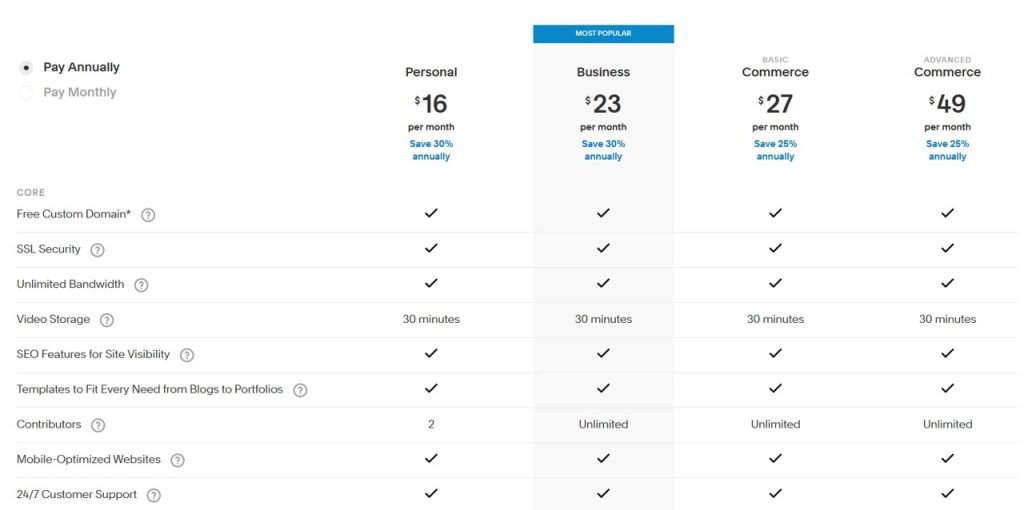
Squarespace Pros
1. Excellent design templates
Squarespace’s design templates are stunning and offer various customization options to help you create a truly unique site.
They are similar to the premium themes of WordPress, except that in Squarespace, they are included in the cost, and you need to pay for them on WordPress.
2. User-friendly
Squarespace is highly user-friendly, so you can create a professional-looking website without prior experience.
3. Easy e-commerce setup
E-commerce on Squarespace is simple to set up and even easier to manage. With just a few clicks, you can add your products, set up payments, and start selling online.
And because Squarespace is built for businesses of all sizes, you can scale your store as your business grows.
Squarespace Cons
1. Expensive
Squarespace is one of the more expensive web hosting options out there.
The cheapest plan starts at $16 per month, and the most expensive plan is $49 per month.
If you want to use Squarespace to sell on different channels, like Amazon, you’ll need the Trunk extension, which starts at $35 per month.
So, while Squarespace is a great platform, it’s essential to be aware of the costs before you commit to using it for your website.
2. Best for visual websites
One disadvantage of Squarespace is that its templates are better suited for visual websites with high-quality images. Thus, it is best suited for websites like photography portfolios.
If you want to build a website or online store with Squarespace, you need to take good pictures of your products.
3. May need professional help for customization
Designing a website on Squarespace with the templates provided can be pretty easy. Still, if you need to do specific customizations, you may need help from a professional designer.
4. Limited payment options
Squarespace’s automatic tax calculations are currently limited to the US, and payment gateway options are quite limited to Stripe and PayPal.
Besides, you can only do single-currency transactions, so it’s not as versatile as some other website builders.
5. Limited GDPR compliance
While Squarespace is GDPR-compliant in the way that it lets visitors know cookies are being used and the hows and whys of it, it does not let visitors have an option to consent to non-essential cookies.
Who should use Squarespace?
Considering its scalable e-commerce templates, Squarespace is suitable for both small and large businesses looking to run successful online stores.
5. Weebly
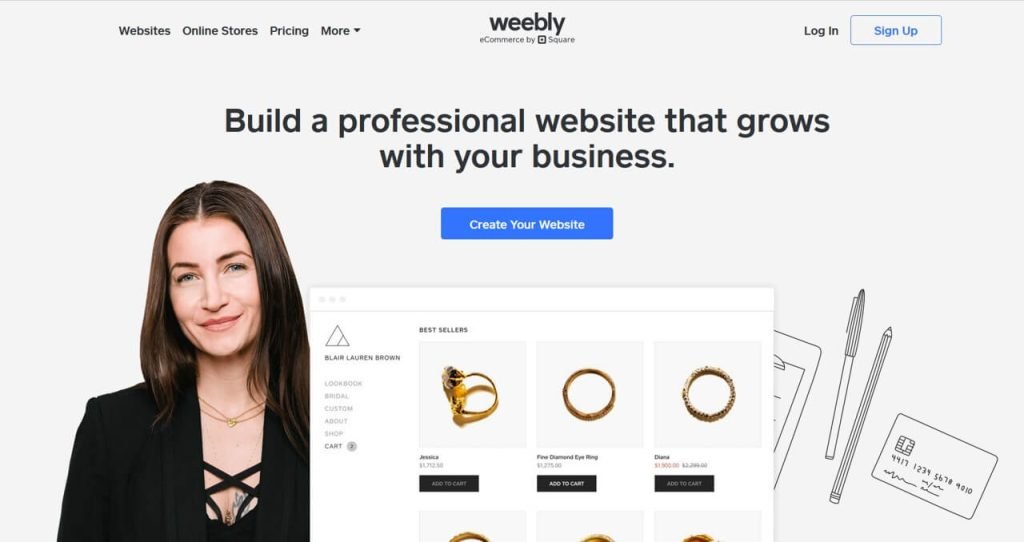
If you want a free forever website builder, Weebly might be your go-to platform.
Weebly is a drag-and-drop website builder that makes it easy to create a professional-looking website, even for beginners. It seamlessly combines a website builder with e-commerce functionalities.
While its SEO features are less sophisticated than other website builders, Weebly still provides features that make your site easily discoverable on search engines.
It enables you to generate sitemaps, add meta descriptions, and customize your URLs. You can also add alt texts to your images to enable them to rank on the image section of SERPs.
Weebly Pricing
Weebly offers a basic plan for free, but it is very limited in its features and, frankly, not worth considering if you make any money through your website and want to look professional.
The minimum plan starts at $10 per month if billed annually, making it one of the most affordable website platforms, and goes up to $26 a month for a plan with maximum features.
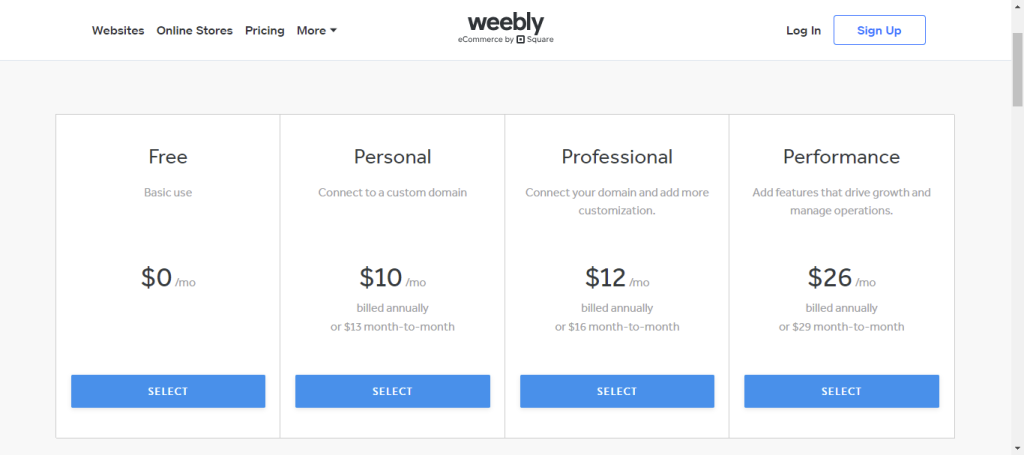
Weebly Pros
1. Price
One of Weebly’s biggest advantages is its low prices. If you have a limited budget and just need a business card website, you can consider Weebly.
Even if you want to upgrade and want a simple, straightforward website, you can get a personal website for just a few dollars per month.
2. User-friendliness
Weebly is very user-friendly, and even if you’ve never created a website before, you can build a beautiful site on Weebly easily and quickly.
Additionally, Weebly offers a wide range of templates and designs, so you can find a style that fits your brand imagery.
Weebly Cons
1. Not great for complex e-commerce
Weebly isn’t the best choice for an e-commerce site. While you can sell products on Weebly, it doesn’t have a robust e-commerce platform like other options, such as Shopify.
2. Limited customization
Because Weebly is such an easy platform to use, it’s also relatively limited in terms of customization options. If you want to make your site stand out, Weebly is not the best option.
3. Not the best for blogging and content marketing/SEO
Weebly is best for personal and freelancer/ portfolio websites if you want to set them up easily and quickly. It does have some blogging and SEO features built in, but it’s more of an afterthought.
If you want to grow your website traffic with content marketing, you should consider a different platform, such as WordPress.
Who should use Weebly?
Weebly’s simple and intuitive interface makes it great for running small business websites, blogs, and basic online stores. If you’re just getting started, you might find it easier to work with sites built with Weebly.
6. GoDaddy
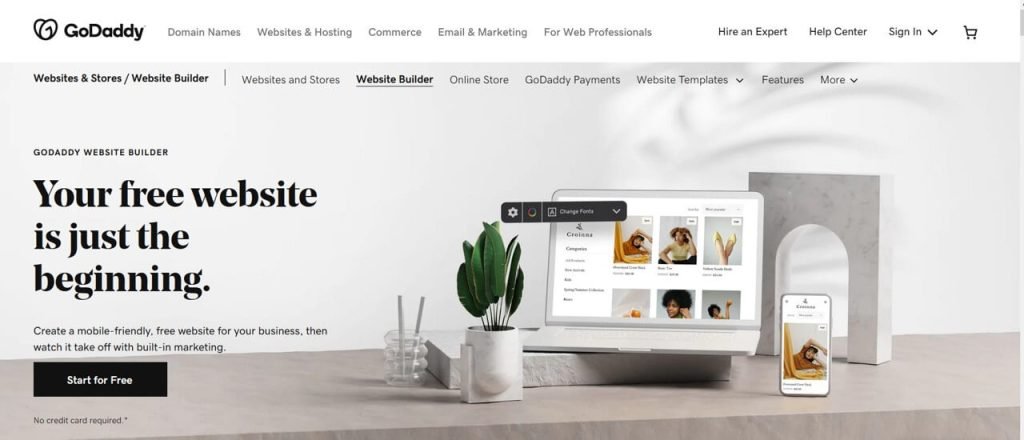
Although it’s popularly known as a WordPress hosting platform, GoDaddy is also a website platform that combines a website builder and marketing features like email marketing and social media posting.
It provides a drag-and-drop editor to help you customize themes or templates to your taste. GoDaddy has over 100 modern, professional templates with sections and blocks you can easily tweak to your needs.
Like other website builders, GoDaddy provides extensive features to enable you to improve your website’s SEO. Its SEO Wizard provides helpful suggestions you can use to optimize your website for better rankings on search engines.
GoDaddy Pricing
GoDaddy starts at $9.99 for a basic website and $16.99 for an e-commerce website, both for annual payments.
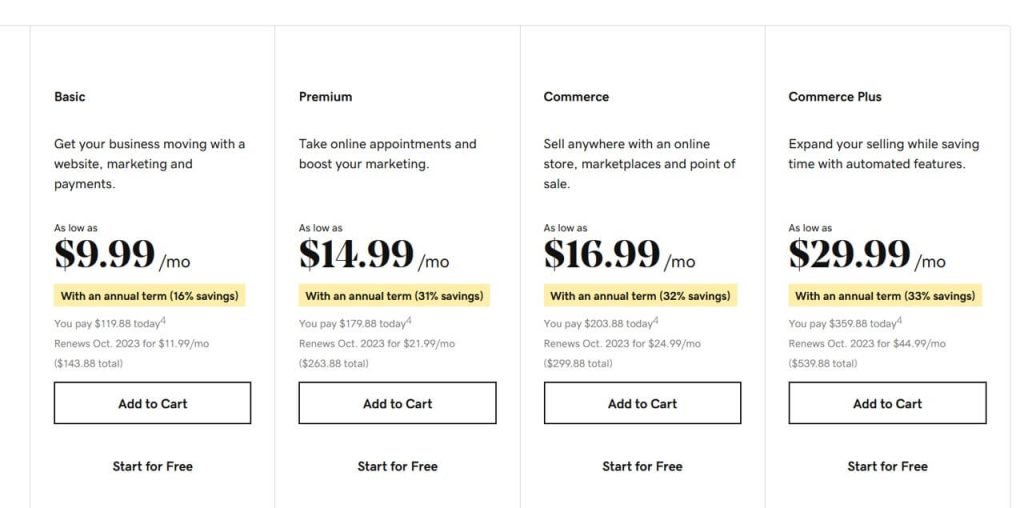
GoDaddy Pros
1. Quick websites with ADI
GoDaddy uses its Artificial Design Intelligence (ADI) technology to allow you to create websites for your category very quickly.
In fact, the website is created for you; you just have to customize your content.
If you don’t want to edit too much, you can have a fully functional website within hours.
2. Integrated marketing communication
GoDaddy lets you seamlessly combine social media, email, content marketing, and SEO tools, making it an easy website platform for marketing.
For example, you can post directly from your GoDaddy dashboard to social media.
3. 24/7 support
Even if it is a simple builder, GoDaddy offers around-the-clock support to help you troubleshoot.
This is helpful, especially if it’s your first time building a website and you may be unsure of what you’re doing.
GoDaddy Cons
1. Limited customization
GoDaddy is a great platform for those who are just getting started with website creation.
However, GoDaddy has minimal customization options.
The available templates are basic, and you cannot make many changes to your site’s layout or design.
2. Limited e-commerce functionalities
The checkout process, tax system setup, and even general e-commerce functionalities are not the best in GoDaddy. These limited e-commerce features make GoDaddy an expensive e-commerce platform, especially compared to website platforms like Squarespace or Wix.
3. No third-party apps
With GoDaddy, what you see is what you get. You can’t add functionalities with third-party apps and integrations.
This makes the design even more limited and difficult to scale.
Who should use GoDaddy?
GoDaddy is an excellent choice for people who want a simple website builder for creating basic websites or blogs. Its limited e-commerce functionalities make it not so ideal for businesses that want to run online stores.
7. Webflow
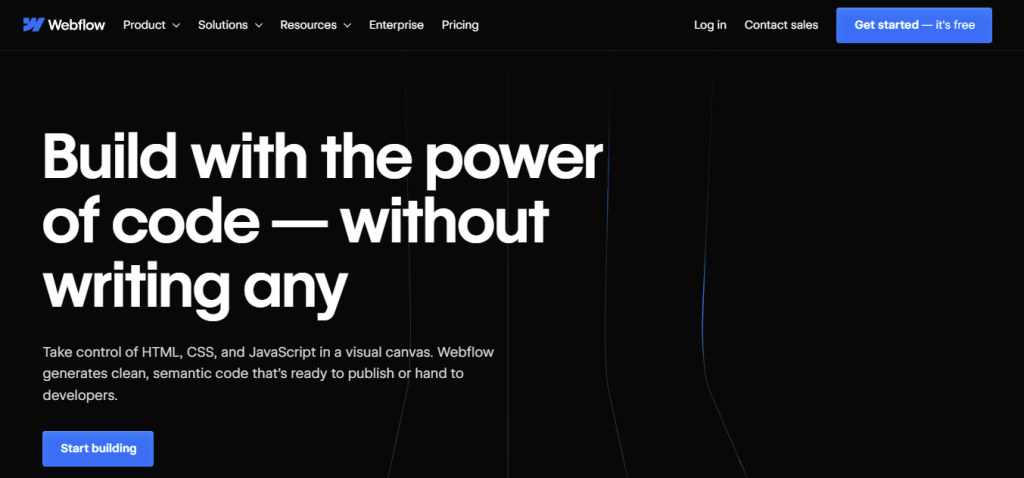
If you want complete control over your website’s SEO, Webflow might be your ideal site builder. Like other website builders in this list, Webflow provides the essential features you need to build your website and optimize it for search engines.
Besides integrating Google Analytics and meta descriptions into your website, Webflow allows you to customize everything. It enables you to create your sitemaps and customize your URLs, title tags, and image alt texts, unlike other site builders that automatically generate them.
I like that most websites built with Webflow are lightning-fast in speed, which gives them a good ranking opportunity.
Webflow pricing
Webflow’s premium plans start at $14 to $212 per month, depending on the category you choose. The general plans range from $14 to $39 monthly, while the e-commerce plans start at $29 to $212 monthly.
There’s also a free forever plan on the general plans. However, this plan only works with Webflow’s subdomain; you can’t connect a custom domain.
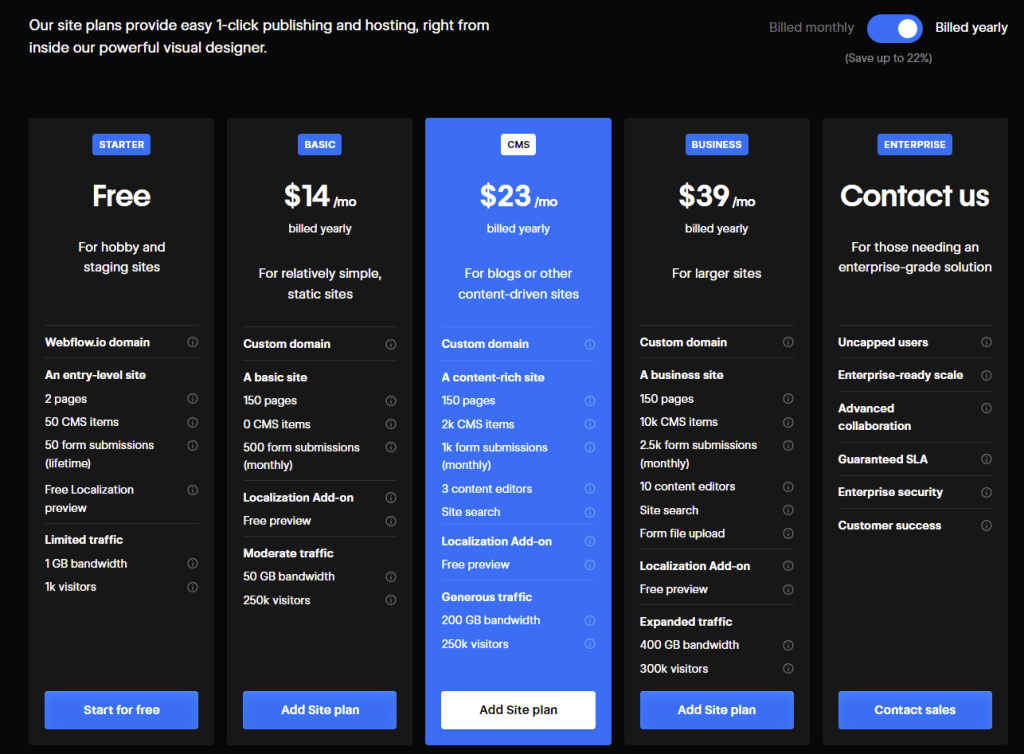
Webflow Pros
1. Responsive design
Websites built with Webflow are responsive to all devices, including desktops and mobiles.
The platform provides professional design tools to help you optimize your website for visual appeal, responsiveness, and interactiveness.
2. Fast-loading pages
Webflow websites delight users and search engines, as they load at lightning speeds.
With the level of customization you have, you can optimize your pages to load faster, enabling search engines to rank them higher on SERPs.
3. Enhanced SEO and design control
The level of design and SEO control Webflow offers is what excites me about the website platform.
While some website builders lock down some critical SEO elements, Webflow allows you to fine-tune everything, from meta descriptions to URLs, title tags, image alt texts, 301 redirects, and schema markups.
4. Third-party integrations
Webflow integrates seamlessly with other apps to give you an astonishing web-building experience.
You can connect your Google Analytics, Google Search Console, Shippo, and other tools to gain deeper insights and optimize your website.
Webflow Cons
1. Steep learning curve
Webflow isn’t as beginner-friendly as other website builders. You’ll have to work your way around finding what to optimize and how to do it.
2. No keyword support
Unlike other website builders like Wix, which supports built-in keyword research tools, Webflow requires you to figure out what keywords to rank for. You can use third-party tools like Semrush, Se Ranking, Moz, etc., to do this.
3. High prices
Webflow has a higher pricing scale than other website builders. At $14 to $212 per month, few people can afford to use Webflow to build their websites.
On a good note, though, I like that Webflow offers a free plan. This enables you to test the tool before committing fully.
Who should use Webflow?
Webflow’s versatility makes it great for both beginners and experienced professionals who want to create high-quality, SEO-friendly custom websites for their businesses.
Tabular Representation of the Features of Different Website Builder Tools
| Feature | Elementor | Shopify | Wix | Squarespace | Weebly | GoDaddy | Webflow |
| Drag-and-drop builder | Yes | Yes | Yes | Yes | Yes | Yes | Yes |
| E-commerce functionality | Integrates with WooCommerce | Comprehensive e-commerce features | Comprehensive e-commerce features, though less advanced than Shopify | Comprehensive e-commerce features | Basic e-commerce features | Godaddy Commerce – an extensive e-commerce tool | Comprehensive e-commerce features |
| Built-in SEO tools | Supports SEO via Yoast plugin | Advanced SEO features | Advanced SEO features | Advanced SEO features | Basic SEO features | Basic SEO features | Advanced SEO features |
| Customizable templates | Yes | Yes, but limited | Over 800 customizable templates | Yes | Yes, but limited customization options | Yes | Yes |
| Free version | Yes | No | Yes | No | Yes | No | Yes |
| Mobile Optimization | Yes | Yes | Yes | Yes | Yes | Yes | Yes |
| Integrated payment processing | Integrates payment with WooCommerce plugin | Integrates payment processing via Shopify Payments, PayPal, Meta Pay, Amazon Pay, Apple Pay, etc. | Processes payments via credit cards, PayPal, and more. | Integrates payment processing through Stripe and PayPal | Integrates payment processing via Square, PayPal, Stripe, Apple Pay and Android Pay | Integrates payment processing via Godaddy Payments, PayPal, Klarna, Stripe, etc | Integrates payment processing via Stripe, PayPal, Donately, Authorize.net, Amazon Payments, Apple Pay, etc. |
| No coding required | Yes | Yes | Yes | Yes | Yes | Yes | Yes |
How to choose the best website builder for SEO: 8 criteria to consider
Let’s look at the key considerations you must make before selecting a website builder that provides your SEO needs:
1. SEO-friendly templates
One of the first things you must look out for in a website builder for SEO is the templates it offers. The templates determine the structure, look, and functionality of your website. If they’re not designed to be SEO-friendly, then you might have issues getting your website to rank on search engines.
Make sure to choose a website builder that offers templates with clean, optimized code for faster loading times and better search engine crawling. The templates should also be mobile-friendly and adaptable to different screen sizes.
2. Flexibility and customization
The best website builders for SEO are flexible and easily customizable. They allow you to easily add and customize meta titles, descriptions, and headers. You can also customize your URL structures to optimize your pages to rank well for specific keywords.
Image search optimization with alt texts is another essential customization feature you should look out for in a website builder for SEO. When you optimize your images by adding keywords in the image alt text sections of your website builder, you help search engines understand your content better and rank them high on the image search section of SERPs.
3. Page loading speed
It’s confirmed that page loading speed is a ranking factor for many search engines, especially Google. Therefore, the website builder for SEO you choose should prioritize fast loading times.
Look out for site builders with robust caching systems, content delivery networks (CDNs), and optimized code for improved page performance.
4. SEO plugins and tools
While it’s common for most website builders to have built-in plugins and tools for SEO, you must look out for those with the right plugins you need.
Powerful SEO website builders provide plugins for keyword optimization, sitemap generation, and performance analysis. Some also allow you to integrate third-party tools like Google Analytics, Google Search Console, and other SEO plugins.
5. Mobile responsiveness
When talking about a website’s SEO, mobile responsiveness is a recurring factor. With over 60% of global web traffic coming from mobile, it’s only right that you choose a website builder that prioritizes mobile optimization.
SEO-friendly website builders provide tools to help you build websites that are adaptable to mobile screens, load pretty fast, and enhance user experiences. They ensure strict adherence to Google’s Mobile First Indexing requirements.
6. Security
Look for a website builder that offers extensive security features to keep your website and its data safe.
Most website builders offer an in-built free SSL certificate to give your site basic protection. But beyond that, the best website builders for SEO provide regular updates to keep your website secure from vulnerabilities.
7. Schema markup support
A good website builder for SEO ensures you design a website that’s not only user-friendly but also search-engine friendly. Your site isn’t search engine-friendly if search engines find it difficult to understand the content and context of your web pages.
That’s why schema markup integration is an essential feature to look for in a website builder, as it’s the language search engines use to read and understand your web pages.
With schema markups, search engines will rank your pages for rich snippets, such as star ratings, event times, or product prices, which can improve click-through rates.
8. Local SEO capabilities
If your business has a physical location, then local SEO capability is an essential criterion you must consider when choosing a website builder.
Look for website builders that allow you to create dedicated location pages, set up a Google Business Profile, and ensure NAP (name, address, and phone number) consistency across all web pages and local listings.
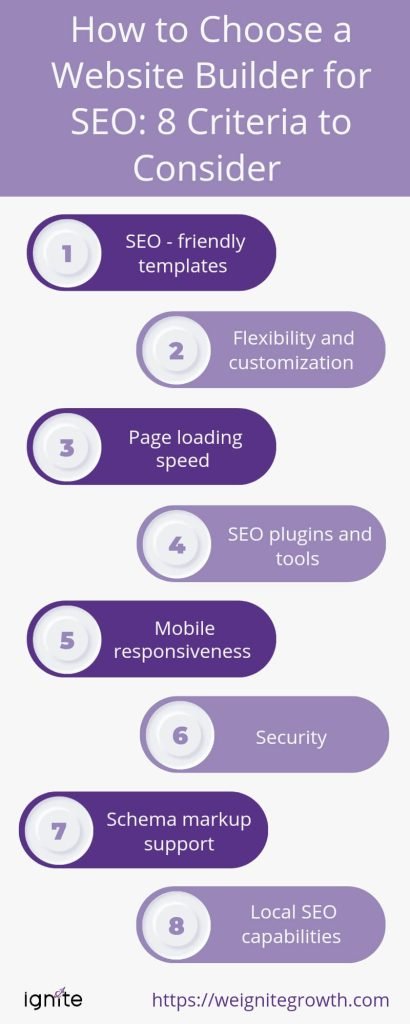
How to choose the best website builder for SEO for your small business – Recommendation
After comparing all the pros and cons of website builders, here’s how to choose one that’s best for your small business.
» If you want a quick, easy website builder to start with your small business brand website, with zero or minimum e-commerce, consider choosing GoDaddy, Weebly, or Wix. Squarespace if you have lovely images.
They are quick and easy, and if you don’t care too much about content marketing, these websites, which offer basic features in content marketing, can be perfect for you.
» If you’re primarily focused on selling products online and are confident of generating enough sales, Shopify and Elementor are excellent choices.
Shopify is a dedicated e-commerce platform you can create yourself, while Elementor works for basic websites and e-commerce. Both website builders are designed to help businesses succeed with online sales, so for e-commerce, it doesn’t get better than that.
» If you want a website that can almost be like a custom-made website by a professional developer, WordPress is the best option.
Choose the best website builder for your SEO needs
Overall, choosing the best website builder for SEO is a critical decision that can significantly impact your online visibility and success. Do your research to ensure you select a website builder that’s suitable for your small business SEO needs.
Read reviews and compare features of the top site builders. Consider your resources and choose a site builder that facilitates the growth of your website.
My recommendation:
If you want a sleek, professional site without the hassle of coding, Elementor is a great option. It’s a drag-and-drop builder for WordPress that offers a lot of flexibility, customization, and SEO tools.
If you want to sell products online, Shopify might be easier it integrates all the e-commerce and SEO tools. You can also do it with Elementor and WooCommerce, but it is a bit more complex.
If you’re still unsure which builder is right for you, get professional SEO web design services. Sometimes, the best choice of a builder comes from an expert who has loads of experience in this field. Feel free to connect with me for a free consultation.
Which is the best website builder for you? Which one do you use currently, and what do you think of it? Share your thoughts!


